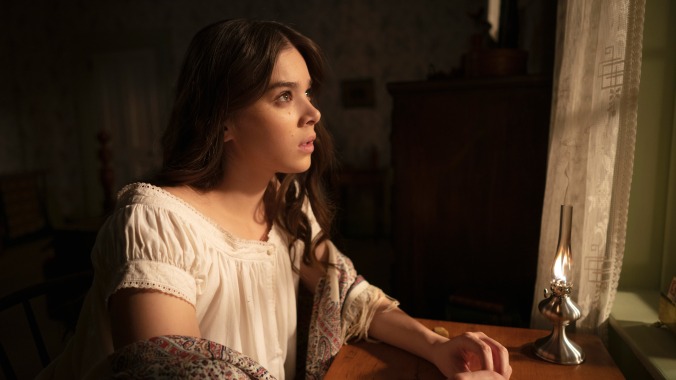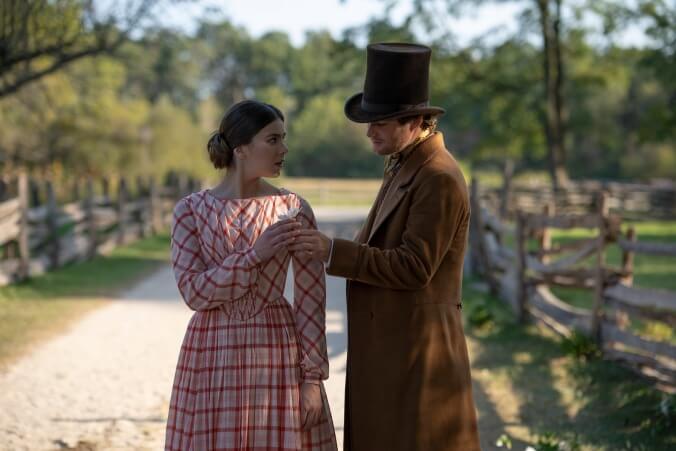Dickinson raises pressing questions about art and politics in an impressive second season


Like a writer finding their voice, the first season of Alena Smith’s Dickinson, an anachronistic coming-of-age story based (loosely and not-so-loosely) on the life of Emily Dickinson, succeeded on some fronts while struggling in others. Series lead Hailee Steinfeld captivated viewers as a more puckish version of the quietly prolific poet than has been held in the public consciousness, hinting at adolescent Emily’s more reclusive instincts along with her volcanic passions. The mishmash of tone—arch one moment, painfully grounded the next, then on to surreal—took a little more getting used to, but by the season-one finale, “I Felt A Funeral, In My Brain,” Smith’s irreverent rendering of the literary icon made Dickinson an early hit for still-relatively new streamer Apple TV+.
Season two, which premiered with three episodes on January 8, is an even more experimental outing for Dickinson, and a greater success. Smith and her writers—including Sophie Zucker, Yael Green, and Ayo Edebiri (who pulls double duty as a scene-stealing Hattie)—have mastered the show’s freewheeling tone; there’s a real sense of complementariness between scenes of bourgeois musings at the salons hosted by proto-influencer Sue Dickinson (Ella Hunt) and the covert meetings among Black abolitionists just a hundred feet away. The humor is heightened, and magical realism features much more prominently. Indeed, Dickinson season two has more of everything: poetry, sex, longing, ambition, relevance, and spot-on performances. The world of Amherst also expands, and with it, the roster of memorable characters.
Steinfeld’s Emily anchors this churning story while also sending it spinning out further, as she reckons with the destructive power of creativity and fame. This is a portrait of a lady—a poet—on fire. The setbacks she experienced last season, including her father Edward’s (Toby Huss) disapproval and her brother Austin’s (Adrian Enscoe) marriage to Sue, haven’t diminished Emily’s output. The season premiere, “Before I Got My Eye Put Out,” opens with a flurry of poems being put to scraps of paper, which are then delivered to Sue’s bedroom door. For now, nothing can stop Emily’s writing—not iritis, not the family’s shifting fortunes. Emily’s found an audience in Sue; or, perhaps more aptly, has made Sue her audience. She eagerly awaits any form of response from her best friend/sister-in-law/one-time lover, but as Amherst’s leading socialite, Sue’s got her own following. In the year or so since she married Austin, Sue’s turned their home, the Evergreens, into the center of Amherstian social life. Her invitations are as coveted as her style; even former queen bee Jane Humphrey Wilkinson (Gus Birney) faints away at the mere mention of a frock’s Viennese design.
Sue’s newfound place at the top of the social pecking order is one of several longer arcs, along with Lavinia’s (Anna Baryshnikov, the show’s no-longer-secret comedy weapon) dalliance with a likable, if excruciatingly traditional, doofus played by Pico Alexander, and Austin’s attempts to emerge from his father’s shadow. More generally, the people of Amherst must contend with change; soon, everyone is caught in the turning gears. For Edward and Emily Norcross (a cracking Jane Krakowski), change comes in the form of an empty nest that is quickly reoccupied. As the country edges toward civil war, the telegraph puts more people from its far-flung corners in touch with each other ever than before, while daily newspapers like the Springfield Republican facilitate the spread of information. And editors like Sam Bowles (Finn Jones, showing more signs of life in his character’s introduction than in two seasons of Iron Fist combined) seek ways to capitalize on this captive audience.
Terms like “timely” and “prescient” pervaded culture writing in 2020, but the connections between our present and the world of Dickinson shouldn’t be underestimated. Smith cites plenty of contemporary influences for her work, yet the fractured political landscape of 1859 requires no hashtag or slang to resonate with viewers (to say nothing of the fact that the second season premiered just two days after an attempted coup of the U.S. Capitol). For all its riffing on language and more malleable conventions, Dickinson is very much grounded in the history of the United States. The raid on Harpers Ferry is touched on late in the season, but before that, Dickinson sees Henry (Chinaza Uche) heading up an abolitionist paper written by Black activists in Amherst, and funded or otherwise supported by white progressives like Austin. Smith juxtaposes Henry’s journalism career with Emily’s aesthetic journey in ways both overt and subtle. When Emily grapples with the possibility of having a poem published in the Springfield Republican, she asks Henry if he would put his own name to his writing if he could. His response is in the affirmative but deliberate, conveying the disproportionate weight of such a decision for a Black man in the 1850s compared to a young white woman from a prominent New England family.
Yet as season two’s narrative steadily ensnarls more storylines and characters, both new and familiar (someone returns just to make a great Oregon Trail joke), Emily holds the center. The new episodes explore her ambivalence about fame, something the real Dickinson struggled with, in inspired and candid fashion. A ghost from the future—you read that right—haunts Emily as she continues to wrestle with the notions of death and immortality, ideas she’s grappled with since the first season. At first, Sam Bowles appears to be as otherworldly a guide for Emily as Death (Wiz Khalifa); he’s sophisticated, handsome, and positively effusive about working with female writers. It’s clear that Sam can open doors for Emily, but whether she wants to step through them is a different matter entirely. It all makes for storytelling that’s both accomplished and raw; Emily at her most famous (in the show’s timeline, that is) is Emily at her most exposed. And still, the questions pour out: about intellectual property, the relationship between artist and audience, and the inherent privilege of being able to worry about such things when Black personhood is on the line. Dickinson season two is just as searching as its subject, and nearly as eloquent.